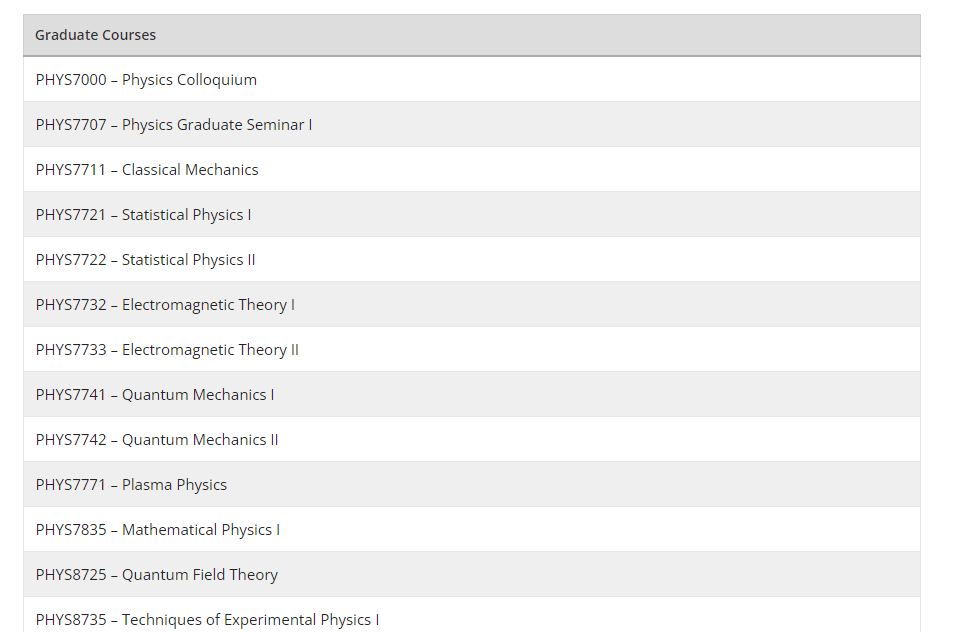Assignment-daixieTM为您提供波士顿学院Boston College PHYS7721 Statistical Physics I 统计物理学代写代考和辅导服务!
Instructions:
Statistical physics is a branch of physics that uses statistical methods to explain the behavior of systems made up of many interacting particles. It seeks to understand the collective behavior of these particles in terms of the laws of physics and probability theory.
In statistical physics, the properties of a macroscopic system, such as temperature, pressure, and entropy, are derived from the statistical properties of the individual particles that make up the system. This approach is based on the assumption that the particles are in thermal equilibrium and that their interactions can be treated statistically.
One of the central concepts in statistical physics is the partition function, which is used to calculate the thermodynamic properties of a system. The partition function is a sum over all possible states of the system, weighted by their probability.
Statistical physics has many applications in fields such as condensed matter physics, astrophysics, and biophysics. It is also used in the study of phase transitions, critical phenomena, and the behavior of complex systems.

For a particular model of a gene in a cell, the probability density that said gene produces a concentration $x$ of proteins during the cell cycle is given by
$$
p(x)=A\left(\frac{x}{b}\right)^N e^{-x / b},
$$
where $b$ is a biological constant with units of concentration, $N$ is a physical constant, and $A$ is a normalization parameter.
(a) The concentration of proteins that can be produced ranges from zero to infinite. What must $A$ be in order for Eq.(1) to be normalized?
(a) Given the range of possible protein production, $x$ can go from 0 to $\infty$. Therefore, for $p(x)$ to be normalized, we must obtain 1 when we integrate the function over this entire domain:
$$
\int_0^{\infty} d x p(x)=1 .
$$
From the definition of the probability density we have
$$
\begin{aligned}
1 & =\int_0^{\infty} d x A\left(\frac{x}{b}\right)^N e^{-x / b} \
& =A \int_0^{\infty} d x\left(\frac{x}{b}\right)^N e^{-x / b} \
& =A \int_0^{\infty} d u b u^N e^{-u} \
& =A b \int_0^{\infty} d u u^N e^{-u},
\end{aligned}
$$
where we changed variables with $u=x / b$ in the third line, and factored the $u$-independent constant out of the integral in the final line. By the integral definition of factorial, we have
$$
N !=\int_0^{\infty} d u u^N e^{-u} .
$$
Therefore, the final line of Eq.(4) becomes
$$
1=A b N !,
$$
and we can conclude
$$
A=\frac{1}{b N !} .
$$
The normalized probability density is therefore
$$
p(x)=\frac{1}{b N !}\left(\frac{x}{b}\right)^N e^{-x / b} .
$$
(b) The mean of a random variable defined by the probability density $p(x)$ (which has a nonzero domain for $x \in[0, \infty)$ ) is
$$
\langle x\rangle=\int_0^{\infty} d x \operatorname{xp}(x) .
$$
Using Eq.(8) to compute this value, we obtain
$$
\begin{aligned}
\langle x\rangle & =\int_0^{\infty} d x x \frac{1}{b N !}\left(\frac{x}{b}\right)^N e^{-x / b} \
& =\frac{1}{N !} \int_0^{\infty} d x\left(\frac{x}{b}\right)^{N+1} e^{-x / b} \
& =\frac{1}{N !} \int_0^{\infty} d u b u^{N+1} e^{-u} \
& =b \frac{(N+1) !}{N !}
\end{aligned}
$$
where in the third line we performed a change of variables with $u=x / b$ and in the final line we used Eq. By the definition of factorial, we ultimately find
$$
\langle x\rangle=b(N+1)
$$
(c) For this probability distribution, compute the average
$$
\left\langle e^{x / a}\right\rangle,
$$
and write the result in terms of an infinite sum over a binomial coefficient. (Note that $e^x=$ $\sum_{j=0}^{\infty} x^j / j !$.)
(c) We now seek to compute the average of $e^{x / a}$. Noting the Taylor series definition of the exponential
$$
e^{x / a}=\sum_{j=0}^{\infty} \frac{(x / a)^j}{j !},
$$
we have
$$
\begin{aligned}
\left\langle e^{x / a}\right\rangle & =\left\langle\sum_{j=0}^{\infty} \frac{(x / a)^j}{j !}\right\rangle \
& =\sum_{j=0}^{\infty} \frac{1}{j !} \frac{1}{a^j}\left\langle x^j\right\rangle .
\end{aligned}
$$
Computing $\left\langle x^j\right\rangle$ yields
$$
\begin{aligned}
\left\langle x^j\right\rangle & =\int_0^{\infty} d x x^j \frac{1}{b N !}\left(\frac{x}{b}\right)^N e^{-x / b} \
& =\frac{b^j}{b N !} \int_0^{\infty} d x\left(\frac{x}{b}\right)^{N+j} e^{-x / b} \
& =\frac{b^j}{b N !} \int_0^{\infty} d u b u^{N+j} e^{-u}
\end{aligned}
$$
$$
=b^j \frac{(N+j) !}{N !}
$$
where in the second line we multiplied the numerator and the denominator by $b^j$, in the third line we performed a change of variables $u=x / b$, and in the final line we used Eq.(5). Inserting this result into Eq.(13), we find
$$
\left\langle e^{x / a}\right\rangle=\sum \sum_{j=0}^{\infty} \frac{1}{j !} \frac{1}{a^j} b^j \frac{(N+j) !}{N !}=\sum_{j=0}^{\infty} \frac{(N+j) !}{j ! N !}\left(\frac{b}{a}\right)^j,
$$
or
$$
\left\langle e^{x / a}\right\rangle=\sum_{j=0}^{\infty}\left(\begin{array}{c}
N+j \
j
\end{array}\right)\left(\frac{b}{a}\right)^j
$$
We note that we could evaluate $\left\langle e^{x / a}\right\rangle$ directly using a change of variables in the argument of the exponential of the distribution. The result would be
$$
\begin{aligned}
\left\langle e^{x / a}\right\rangle & =\frac{1}{b N !} \int_0^{\infty} d x e^{x / a}\left(\frac{x}{b}\right)^N e^{-x / b} \
& =\frac{1}{b N !} \int_0^{\infty} d x\left(\frac{x}{b}\right)^N e^{-(1 / b-1 / a) x} \
& =\frac{1}{b N !} \int_0^{\infty} d u \frac{a b}{a-b}\left(\frac{a u}{a-b}\right)^N e^{-u} \
& =\frac{1}{N !}\left(\frac{a}{a-b}\right)^{N+1} \int_0^{\infty} d u u^N e^{-u} \
& =\frac{1}{(1-b / a)^{N+1}},
\end{aligned}
$$
where in the second line we made the change of variables $u=x(a-b) / a b$. Considering Eq.(16), the result Eq.(17) implies
$$
\sum_{j=0}^{\infty}\left(\begin{array}{c}
N+j \
j
\end{array}\right) q^j=\frac{1}{(1-q)^{N+1}}
$$
